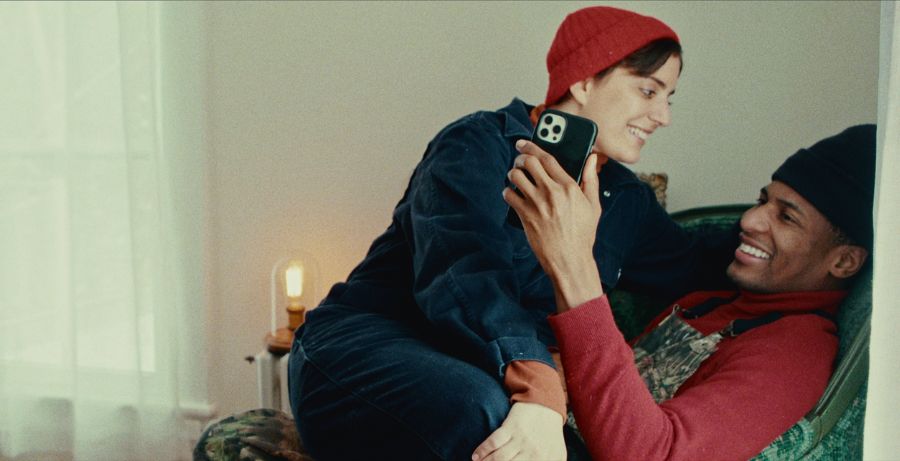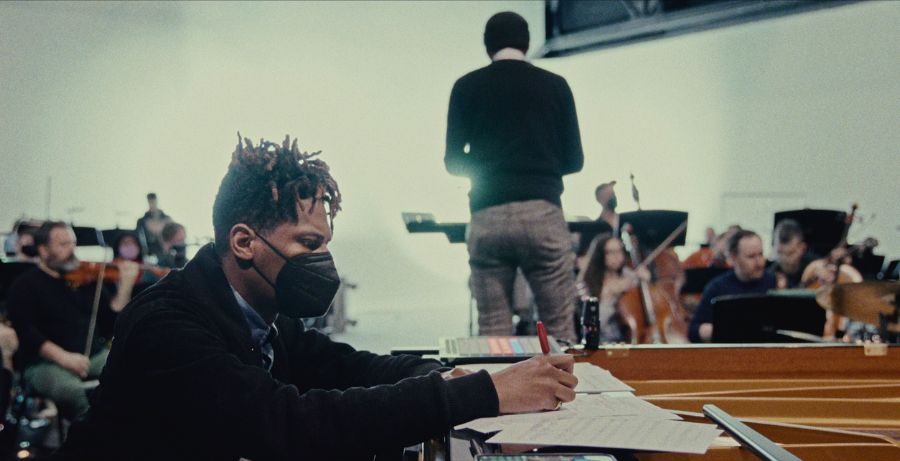American Symphony, directed by Matthew Heineman, is a Netflix Original documentary about Grammy-winning musician Jon Batiste and his journey from growing up in New Orleans, becoming the front man to Stephen Colbert’s Late Show band, receiving copious Grammy nominations, and creating and performing the American Symphony at Carnegie Hall, all while his wife Suleika Jaouad underwent treatment for leukemia.
Jon sets the tone for the documentary very early on, explaining, “I feel like we’re living a life of contrasts.” Jon’s meteoric rise in popularity, fame, and acclaim coincided horribly with Suleika’s cancer remission and treatment. So, for the full length of the movie, most of the dialogue, narration, and imagery juxtaposes great joy with deep distress. Jon, famously all smiles all the time, is seen jumping up and down with glee at the same time his narration or his music expresses great sadness or consternation. It’s technically interesting to revolve the whole documentary around these opposite experiences, but in practice, it largely either comes off as disingenuous or as simply not deep enough.
Jon basically tries to draw a connection between fighting cancer and fighting the universe with the power of music. It’s an interesting equivalency, and you can tell he certainly believes in it through his religious/spiritual worldview and his eternally optimistic disposition. But mostly, the contrast between winning Album of the Year and spending every hour in bed sick from chemotherapy is just too absurd to bear. Jon’s burden of succeeding so greatly while his partner endures the worst experience of her life simply doesn’t compare to Suleika’s burden of having the worst experience of her life.
While we get some moments of narration from Suleika throughout the movie, it has the same unfortunate effect on me as when a Scorsese movie switches from its male protagonist narrator to its female lead momentarily. It helps somewhat illuminate Suleika’s full humanity and what she’s going through from her own perspective. But ultimately, the movie is still told through Jon’s point of view, so beyond those few brief moments in Suleika’s head, we are offered very limited access to her interiority.

The entire crux of American Symphony is the pain and difficulty of Jon’s launch into stratospheric fame and success while she undergoes intense cancer treatment. But as somebody whose own journey and pain are initially imposed as the secondary impetus for the whole movie, Suleika only appears on-screen if Jon is there too. That is, save for one sequence early on where we at least get to know, from her own perspective, who Suleika was before the start of the film.
So to only see Suleika appear in the film now and again, and to see most of those moments offered through Jon’s eyes, unfortunately, renders her feeling like a character in the grand story of Jon’s life rather than a person going through her own harrowing experience (of greater measure than his own). Surely this wasn’t the intention. Their love for one another shines through relentlessly, whether in the hospital bed or on board a sleigh for the first time in John’s life. And his pain of not being able to alleviate Suleika’s is quite clear. But it’s discomforting to have Suleika diminished in this way so regularly.
It’s not that the concept of the documentary doesn’t make sense. It’s just locked too hard into Batiste’s limited personal perspective to annunciate the myriad of interesting and vital aspects of his surroundings and influences that dictate his experience. We get a limited vision of Jon’s upbringing and a nice little scene with a longtime teacher of his. But the vast history of Batiste, his city of New Orleans, and the generations of Black music that he regularly alludes to are not sufficiently explored in the text of the film itself to give the viewer the emotional perspective required to see his successes, the American Symphony, or the burdens he carries with them as imperative the way the film implies they are.
You can surmise all of this through context clues and a basic understanding of history, but a technical understanding of the difficulty of Batiste’s burden is a far cry from the emotional attachment to it a better documentary would have engendered by focusing more on those aspects and less on prolonged shots of similar rehearsal scenes over and over, perhaps. More of Suleika’s perspective and more of the socio-cultural and musical history of the gravity of Batiste’s work and success would have made the film feel much more complete.

Audiences don’t even really get a sense of the music that won Batiste his Grammys, which is such an important part of the movie’s arc. We see him goofing around in his earlier period with his melodica, getting a nice chance for him to explain why that instrument is so important to him. This is actually one of the best parts of the movie, helping at least humanize Jon for those who have only ever known him as the Late Show frontman. And we see a lot of, albeit perhaps still not enough, the American Symphony. But Batiste is such a musically complicated artist and I still hardly feel like I’ve been able to crack the surface of his musicality and what actually makes him the multi-award-winning artist that he is.
Fans of music, regardless of their previous exposure to Batiste, should absolutely give American Symphony a watch. Learning about this figure, his work, his journey, and the influences that brought him there are all fascinating. The emotional scope is just too limited by solely focusing on Batiste’s perspective. Clearly, so much of the world around him deserves to shine too. His wife Suleika is too diminished in the story for somebody whose own suffering drives the entire purpose of the documentary. And, for all of the ways American Symphony focuses on Jon, it still feels like he’s shrouded in mystery, as a musician, and as a man.
What is Jon really like when he’s not playing for the cameras? What about his music makes it so masterful and so important culturally and historically? American Symphony won’t answer any of these questions, but it will definitely make you interested to seek out the answers yourself because ultimately, he is still portrayed as a deeply fascinating, talented, thoughtful, and loving figure.
American Symphony is streaming now on Netflix.
American Symphony
-
Rating - 6/106/10
TL;DR
Fans of music, regardless of their previous exposure to Batiste, should absolutely give American Symphony a watch. It’s just too limited by being solely focused on Batiste’s perspective when clearly so much of the world around him deserves to shine too.







